GAP Outlet, McArthur Glen, Livingston
40% Everything Instore
Complete the Customer Survey below PRIOR to shopping
https://gapinceuropeces.com/#/GAP/English
Take a Screenshot of your Voucher Code
📢Get 60% EVERYTHING at the til📢


GAP Outlet, McArthur Glen, Livingston
40% Everything Instore
Complete the Customer Survey below PRIOR to shopping
https://gapinceuropeces.com/#/GAP/English
Take a Screenshot of your Voucher Code
📢Get 60% EVERYTHING at the til📢

 Image copyright Gavin D’Souza
Image copyright Gavin D’Souza Working fathers are frequently reducing their hours or taking on a less stressful role in order to balance their work and family lives, a new study has found.
According to the charity Working Families, a third of fathers they surveyed said they would take a pay cut in order to be more involved in their children’s lives and as many again said they felt burnt out trying to juggle work and parental responsibilities.
BBC audiences have been sharing their experiences about how they cope.
“I worked as a sound engineer for six or seven days-a-week for ten years, with no specific work times, no overtime and no extra pay. That’s just how the industry works.
“On top of that I had to get home early so my wife Kim could go to work in the evenings, she had to work so we could pay the rent on the house.
“I quickly got another job but things are even worse. This new job has no holidays and no regular working hours at all.
“I have had numerous opportunities to work abroad but I declined them so I could be a part of my daughter’s life as she grows up.
“I’ve decided to quit my new job, and today after just two months I’m leaving.
“Now I’m looking to start a business where I can spend more time with my family.”
 Image copyright Jessica Shuttleworth
Image copyright Jessica Shuttleworth Jessica: “My husband and I made the decision when our son was born that I should work full time and he would work part time and be the stay-at-home parent. This is because, as a woman, I get far more rights as a working mother than he would as a working father.
“I am entitled to flexible working and have more legal rights. I work 36 hours a week and he works between 16 and 18, split over a Friday afternoon and Sunday afternoon which means we are at home together on a Saturday and our son only has to go to a nursery for one afternoon a week.
“It’s been eight months and it’s working so far. Dan is happy because he is at home with our son and also has a job so he feels like he is contributing to our income and Louis (our son) is happy because he has a parent at home during the week.
“We earn enough to get by and get no help from the state with our son other than child benefit.”
“In my role, it’s really hard to find a healthy work-life-balance. In a lot of companies you will get benefits, such as salary increase based on the effort you invest into your job. If you are not focused on your career, then you will get no increase or not the amount that would be needed.
“If you are focused just on your career you will miss beautiful moments with your child.
“If you would like to spend more time taking care of your child, you have to work hard. Then it becomes a circle, like an infinite loop, that you cannot close.
“Some people advise to either not work that hard or to move to another company, but this is nonsense. Why? Because your family needs money. More money comes from higher appreciation at work. This comes from more hard work. However, it will also reduce the time you have for your family.
“In addition, the parental leave we have here in Hungary is near to nothing. We get two days of parental leave per year per child, which is not enough. Salary increases are also not a trend here, at least not in my case.”
“I jumped off the career ladder about five or six years ago – a decision taken with my wife to effectively swap roles; she’d worked part-time since the first of our two sons was born.
“She wanted to get back to her career, and I was painfully aware of missing out on being around my boys. We had enough cash to fall back on that my not working for a while wouldn’t cause problems and then I started working part-time from home as a writer.
“There are a lot of unexpected barriers and challenges when you’re a stay-at-home dad – they almost all boil down to other people’s attitudes.
 Image copyright Sean Fleming
Image copyright Sean Fleming “When the time came that I wanted to get back to work I met some almost hostile responses. Many people struggled to accept that a man would want to spend more time at home with his kids for a while.
“I asked a few of them ‘would you be so negative in the face of a woman returning to work after a prolonged child-related career break?’ The answer was always ‘no’ and was often followed by an uncomfortable acceptance that they were regarding me differently solely because of my gender.
“It’s a real eye-opener into tacit acceptance of gender-defined roles in society. That’s something facing both men and women and it needs to change.
“These days I work as a copywriter for a marketing agency. I spend three days in the office and two days at home. It feels like a good balance. But it’s important to accept that balance comes at a cost.
“I earn about a third less than I did about six years ago and half what I might be earning had I stayed on the career ladder. But it’s definitely been worth it.”
“Nearly three years ago I changed jobs. I took a pay cut purely for the reason of getting a better work-life balance and importantly to spend more time with my two kids. It is a move that I have not regretted.
“Previously the stress levels I was working under were making me ill. The previous job also was further away from home, so I was spending between three-and-a-half to four hours travelling every day.
“My wife and I both still work full time – we could not afford the mortgage otherwise. Life is still a struggle, but we get by.
 Image copyright Julian Wallond
Image copyright Julian Wallond “The family have breakfast together every morning now. I can now see that my kids leave home to get on the bus to school before I travel to work. I work one day a week from home and that also is invaluable.
“It means I can help with things like getting the kids to and from after-school activities – both my children are members of the local swimming club and train for around 10 hours a week.
“Family is so much more important than a career. My new employer, Virgin Media, has been good to me.”
“I have struggled with this for many years, choosing to be paid at 80% while working 100%. I forego a larger salary for the right to look my colleagues in the eye when I’m leaving early two afternoons a week to meet the school bus.
“Yet as a manager, my commitment and my ability to manage has been called into question a few times. ‘Why don’t you get an au pair?’ I’ve been asked. Or ‘why don’t you ask your wife to work less?’
“As a man, I know the expectations on men can be tough when we want to step out of a stereotype.”
“I think this is a very important area for the UK to improve. My daughter was born in Halifax, Nova Scotia and Canadian law is much more even-handed.
“At the time my wife was self-employed and so I was able to take our entire allocation of parental leave. This allowed me to be there full time for my daughter for the first eight months of her life.
“I also had the great fortune to be working for a very enlightened employer whose policy topped up my state allowance to 95% of my salary.

“To say this was the most important and precious time of my life is an understatement. It allowed my wife and I to fully share the role of parenting and I feel we are much stronger as a family as a result.
“As a middle manager I was the first man to take advantage of this at my job and contrary to complaining and worrying about how they would cope, my bosses were more concerned with baby showers. I felt totally supported.
“What did the employer get out of this? A whole lot of loyalty and an employee that worked hard happily, who dealt with personnel issues with compassion and empathy and a very low staff turnover rate. All intangible I know, but as an employer, if you go to bat for your employees, they will do the same for you.”
“Living and working in the Middle East has posed even larger issues with work-life balance.
“With the constant drive to meet deadlines, as well as meeting client expectations, work-life balance is generally not taken into account by bosses.
“Due to ensuring that the clients are kept happy and that revenue is maximised, it is rare that I and a lot of others in this part of the world are allowed to take more than two weeks leave at a time, even though by law we are entitled to four weeks a year paid vacation.
“Due to the excessive client expectations, six-day working weeks are the norm so getting time to spend with your family is far and few between, to the extent that I will pull a sickie if I know my kid, wife or both have an impromptu day off (my wife is a teacher and my kid is in nursery).
“I’m constantly looking for work outside the Middle East that offers a better working schedule so I can spend time with my family.”
By Annie Flury, UGC and Social News Team
Article from BBC News
For the past few years, my husband and I have donated food to the local Food Bank rather than spend money sending Christmas cards. It’s our way of doing an extra bit for charity. It’s criminal that in this day and age we have so many people using AND relying on Food Banks to survive. I’ve never actually thought about what families with newborn babies do until I read this article on the STV News website today. To warn you it’s a heart breaking read, but equally it’s heart warming to know that there are some extremely kind and generous people out there. Devastatingly though, they have 2 weeks to move out of their premises with nowhere to go! With nowhere to go, they will be forced to close. It doesn’t bear thinking about those poor babies with no nappies or milk, or the worry and anxiety that their parents will go through. What can we do? Do you know anyone who can help? Please share this article and tag anyone who you think could help.
Last plea: Scotland’s Baby Bank faces closure. STV/Laura Piper
It’s snowing and a wintry cold January day when the call comes through.
A young father, just 19 years old, is in crisis. His little baby boy is hungry but he has no more milk to give him.
Desperate, he has already gone without food himself to feed his son. He’s given up every penny he has but now he has nothing more to give.
On the other end of the line, Bernadette Murphy is already packing everything she can find into a bag for him.
Nappies are put in, milk and extra food for them both. Warm clothes are added for the father, too.
“That’s what we always do,” she says. “We make sure they have a warm coat and a good pair of shoes.”
It’s the first few weeks of a new year in Scotland, 2017, and Bernadette listens while yet another call comes through from a family at breaking point.
On Tuesday, the grandmother had ten emergency cases. Today she has taken on five and it has not even hit lunchtime.
“It breaks my heart,” she says. “Nearly every day I take a call about a parent who has reached rock bottom, trying to feed their child. Can you imagine what that desperation must feel like?”
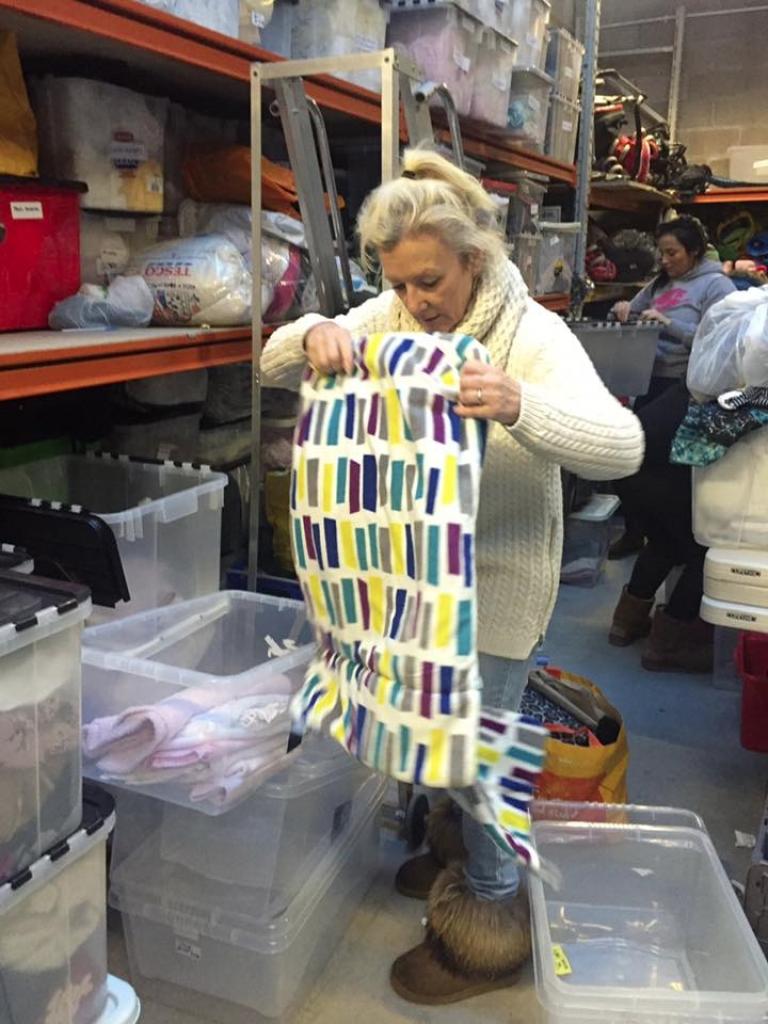
Over the last year, Bernadette has heard from more than 1500 desperate voices which she says is something she can never get used to.
Every call comes from a social worker, or another professional agency, each representing a family in need.
Lanarkshire Baby Bank, which she founded in a large industrial unit in Coatbridge, is a lifeline for parents who have nowhere else to turn.
Now though, with just two weeks to go until they lose their premises, Bernadette is anxious for their future and for the welfare of those she and her volunteers support.
“We were given notice to quit the unit but we have nowhere else to go,” she says.
“We receive no funding and totally rely on kind donors and our amazing team of dedicated, hard-working and selfless volunteers.”
If a new home cannot be found, Scotland’s only baby bank will be forced to close.
“I cannot think about it, I can’t,” says Bernadette. “I have hope. If I didn’t, my heart would break.”
“I have hope. If I didn’t, my heart would break.”Bernadette Murphy
At the age of 55, Bernadette works 18 hours a day to operate the baby bank she founded, posting emotional pleas for donations when emergency cases come through, even answering calls at 3am from parents in need.
A whirlwind of efficiency, she is most often found in the unit, dressed in baggy jumpers with her blonde hair swept up in a bouncy pony tail, dishing out hugs and orders for nappies in equal measure.
“I started Lanarkshire Baby Bank after my little granddaughter was born,” she says.
“It’s amazing how much your life changes when a child comes into it.
“I live in a small village and I started noticing real poverty. We have a lot of good food banks but I felt more needed to be done for babies and mothers.”
Every donation she gets is carefully stored in the industrial estate in towering racks holding plastic boxes.
The room is icy cold and the volunteers’ hands are numb as they come each day to sort through the items.
The labels on the boxes show the range of children they help, with cases of booties, socks and shoes sized from birth to primary school.
There are prams, baskets, formula milk and canned food. Clothes for children and adults, with baskets of toys to make little faces smile.
For the mothers, there are handbags, special gifts filled with toiletries.
“We give away 120 packets of sanitary towels a week,” says Bernadette. Her smile is grim.
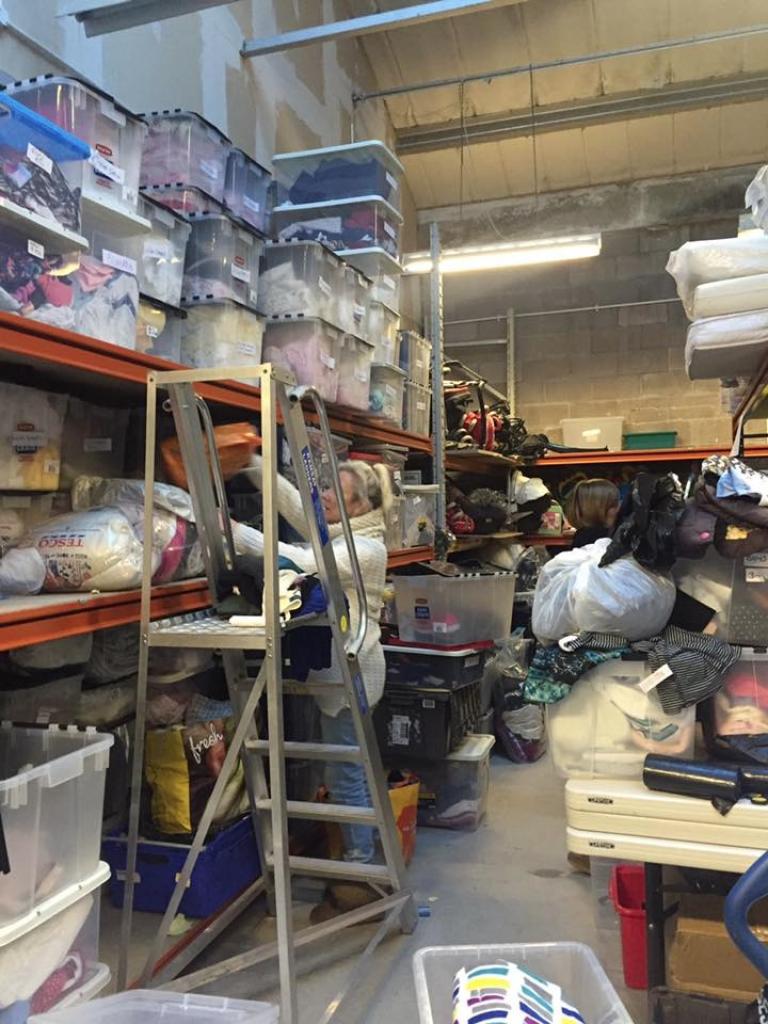
One mother Bernadette remembers was a 26-year-old in October, who was hit with four months of benefits sanctions. She had a little boy who was only two years old.
“She was just a poor soul,” says Bernadette. “She’d left her house at 7.30am that morning and had been walking around from agency to agency pleading for help.
“She was running low on nappies and had very little food and didn’t know what to do. As a last resort she came to me after the Citizens Advice Bureau told her to call me.”
The 26-year-old mother’s situation was so desperate, says Bernadette, that she had gone without sanitary towels to buy what she could to feed her son.
“She had gone to a public bathroom to get a wad of toilet roll instead,” she says. “I remember crying when the call came through.”
The last few months have been an urgent search by Bernadette and her team for a new home but so far nothing has been found.
With no guaranteed income and a project run entirely on kindness and the goodwill of others, they are relying, as Bernadette says, “on a huge miracle”.
“Time is running out,” she says. “Everywhere I look, the rooms just seem so expensive.”
With the amount of stock they have, the team estimate they need a new unit measuring around 3500sq ft. They have until January 27 to find one.
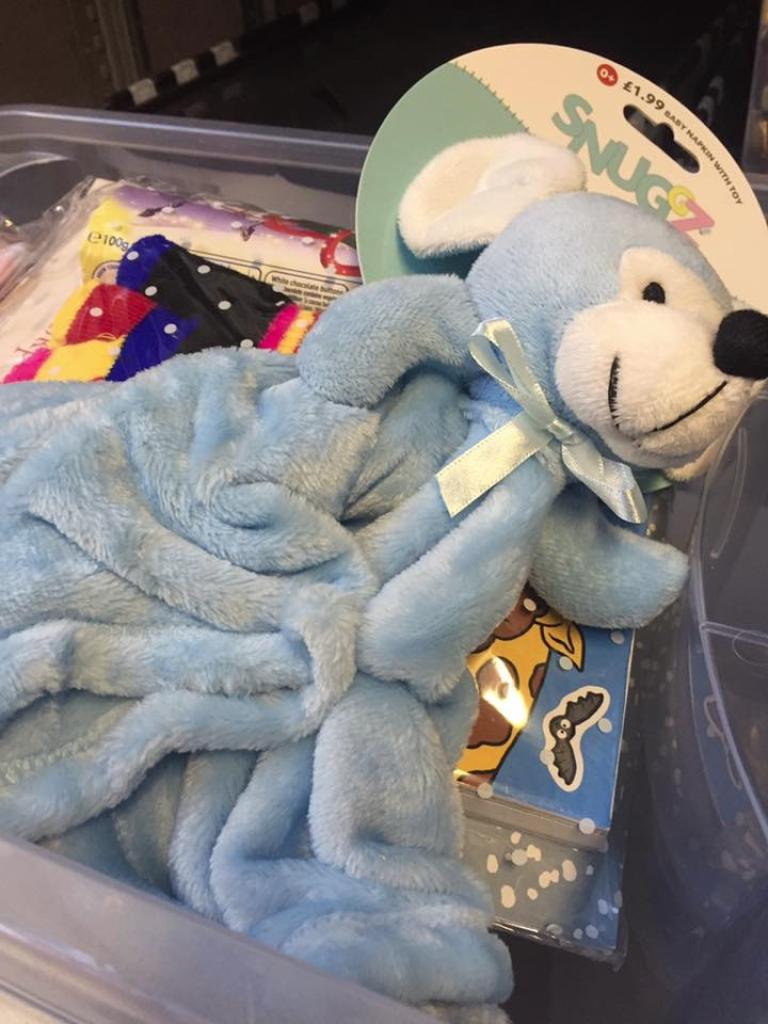
Over the last few weeks, Bernadette has taken to social media to beg for help, to ask if anyone knows of a unit to spare that they could afford.
What she did not expect in reply, was the many mothers she has supported over the year stepping forward to offer their help.
“I want to share my story,” says Karen McGuire, 37.
“Bernadette was there for me and my kids when no one else was and my heart is breaking for her.
“They get no funding whatsoever and it’s just so, so sad that they’re in this situation.”
Single mother Karen approached the baby bank after her daughter’s school suggested she ask Bernadette for help.
“My eldest daughter, Jenna, was due to go on a school trip but my partner had just left me,” says Karen.
“The school had sent out a list of things she would need for camping but I simply couldn’t afford it.
“I was panicking and worried sick, I didn’t want her to feel left out or tell her that she couldn’t go anymore just because of the financial situation we were in.”
Anxious to not let her daughter feel excluded, Karen left a message on the baby bank Facebook page.
Bernadette, she says, phoned her straight away and asked what it was Jenna required. Within a few hours, the team had sourced everything the 11-year-old would need.
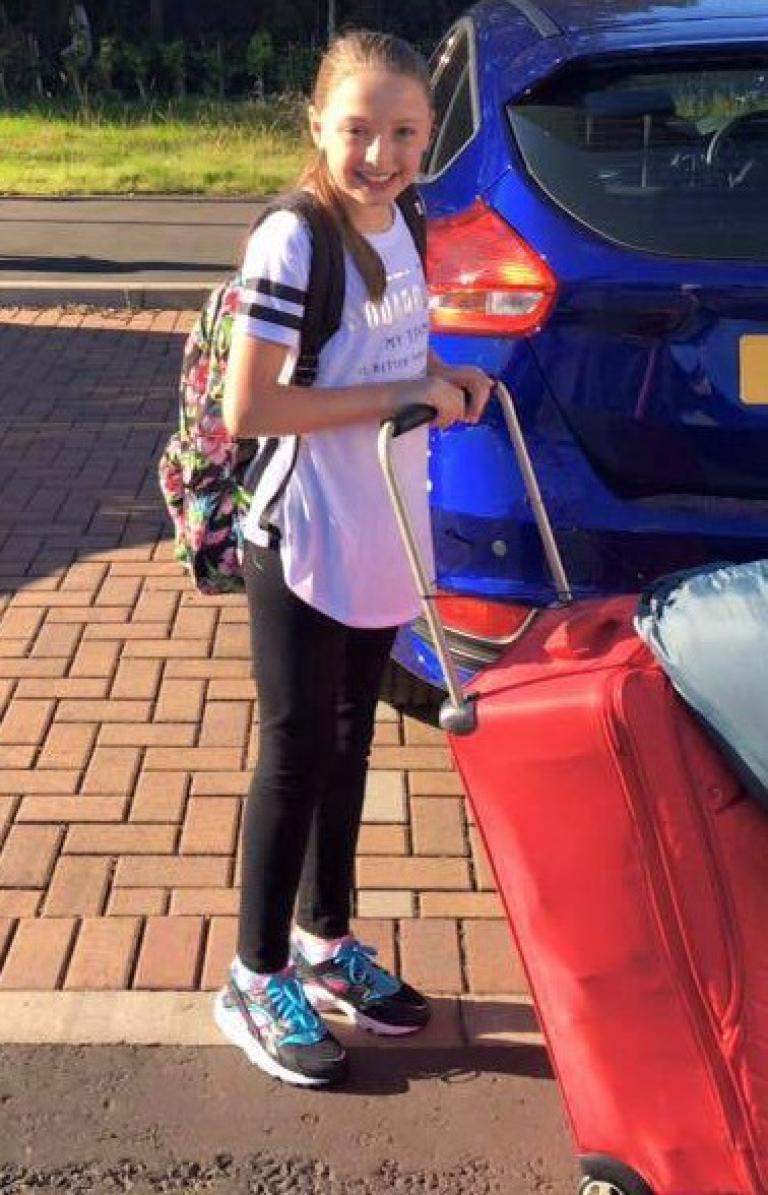
“They got her a suitcase, a sleeping bag, they even got her a Superdry outdoor jacket,” says Karen.
“I was in tears when everything came. They even thought of my little three-year-old and gave her her own torch so she could play at camping with her big sister.”
The team had even packed a bag for Heather too, understanding that life for the family could be tough. They gave her a new warm jacket, some books, and a special gift for Christmas.
Most importantly, though, Karen says it made her daughter feel just like everyone else, as she deserved.
“She went and made some great memories with her classmates,” says Karen.
“Bernadette is an absolute angel. I cannot thank her enough.”
“I was in tears when everything came.”Karen McGuire
Like Karen, more mothers have come forward, anxious to share their own stories of how Bernadette has helped them in the hope it might help draw attention to how vital the baby bank is in Scotland.
One mother, Lisa, took in her brother’s two young boys after he passed away but struggled to afford clothes and bedding for them on top of providing for her own three daughters.
The baby bank got them everything they needed and offered to get beds for the boys once the family moved to a bigger house.
“We’ve had to go on a council waiting list for one,” says Lisa. “I had to leave my job to take the two boys on and it’s been a bit of struggle.
“My husband and I are sleeping on the couch at the moment while we wait for something bigger.”
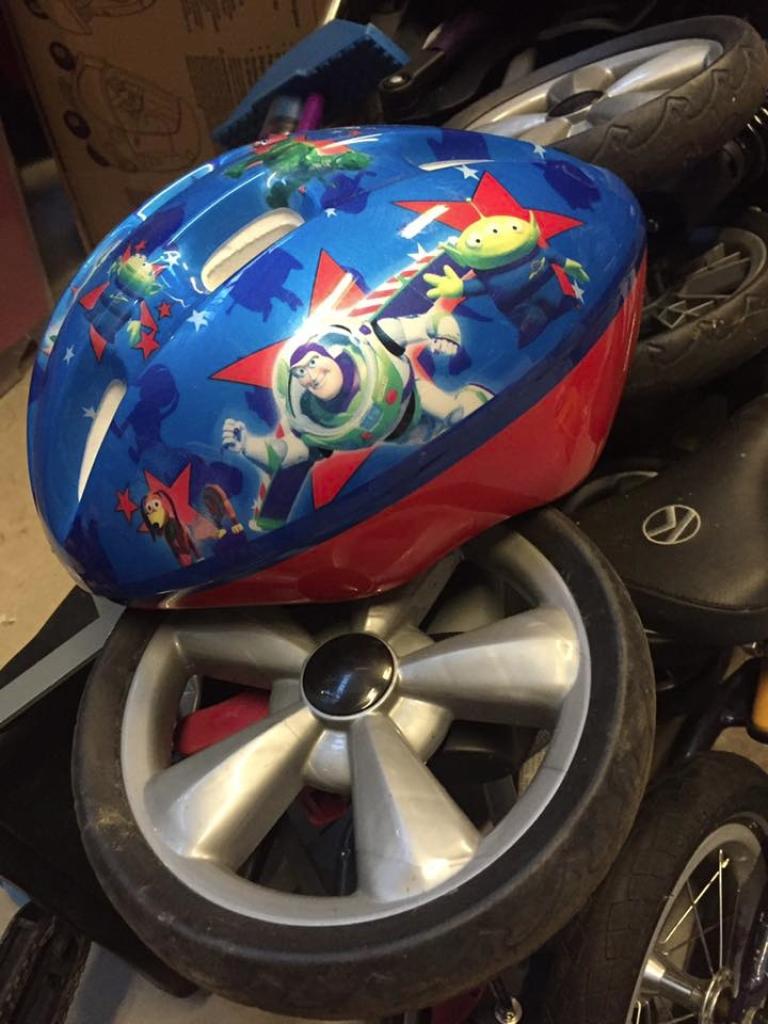
Heather Underwood, 33, was desperately struggling to afford food for her baby son when she was encouraged to ask Bernadette for help.
“I was in a situation of domestic violence and I was moved into homeless accommodation until they found a new place for me and my children,” says Heather.
“It was just so hard to get everything together for them during that time, and Bernadette helped me get clothing and food for them when times were hard.
“Sometimes others don’t understand how hard it can be to be in a situation where families struggle and feel bad that they may not be able to provide things for their kids. The baby bank takes so much pressure off the family.”

Even more mothers call including Sandy, 36, a single parent whose benefits got stopped in error and took longer than she could budget for to sort out.
“I spilt up with the father of my children, I’ve got four and a wee baby and simply didn’t have enough food to last us until the benefits were sorted,” she says.
“I had no nappies yet for my youngest daughter and I was in tears when the volunteers came with baby milk, wipes, everything I could need for her.
“They even brought toys for all my kids, they were there within two hours. It was incredible.”
The quick response the baby bank always seems to provide is a common theme mentioned among the mothers.
All say they receive the emergency food or nappies they need, allwithin a few hours. They also all mention the genuine kindness that is delivered with them.
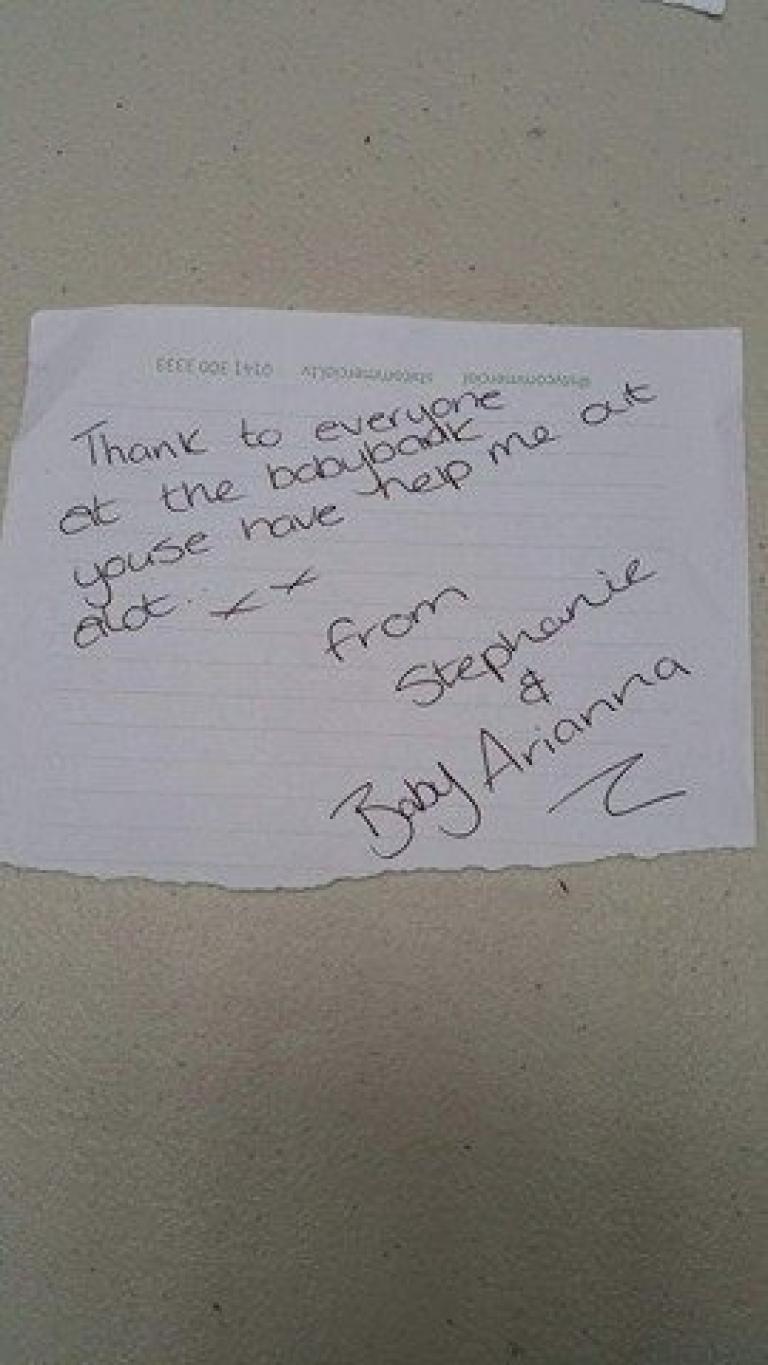
Many say Bernadette keeps in touch with them, checking up to see they are safe and provided for.
She also sends them messages and inspirational quotes, making them feel they are not alone.
“As a single parent it is really hard. I was in tears when they came,” says Sandy.
“They go over and beyond to help you. If it wasn’t for them I don’t know what I’d do.
“I don’t really talk to my family but these absolute strangers who don’t even know me helped me.”
Sandy and many others now donate their old baby items in turn to give back what they can to help.
“I wouldn’t wish this on anybody, so anything I can do to help I will,” says Sandy.
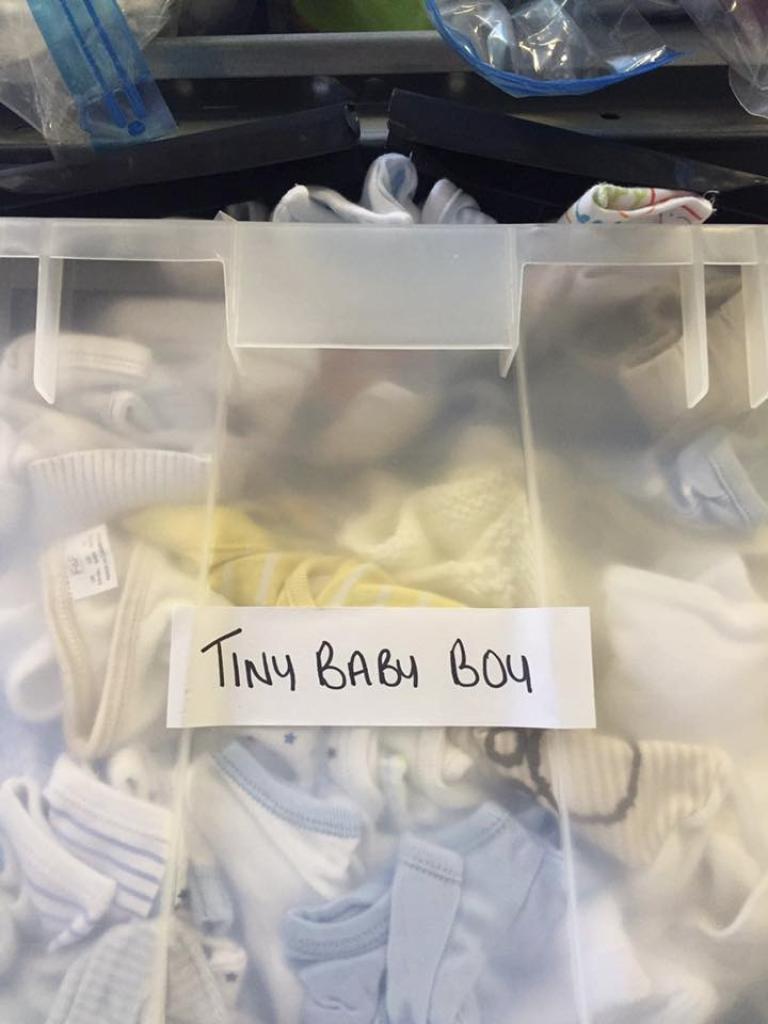
It is the prospect this situation could land on anybody that Bernadette says is key to the baby bank’s future.
“People need to understand that these women could be anyone – your daughter, a next door neighbour, the lawyer at the end of the street,” she says.
“Loads of people come to me who are working but they’re on zero-hour contracts and they’re struggling.
“It really is a case of them being faced each day with the choice of either heating their homes or buying food for their children.”
Bernadette describes several families she knows of who have taken donated sleeping bags.
“They pretend to their children that it’s a big camping adventure,” says Bernadette.
“They’re pretending to go camping with their kids to keep them warm.”
One of the worst cases, she says, was a young mother and her baby who a health visitor called her about.
“She found the little baby sleeping in a drawer on a pillow, covered in a thin sheet,” says Bernadette.
“She came back to the unit and cried in my arms. That’s the reality in Scotland right now and it’s despicable.”
“Some people get sanctioned because they’re 15 minutes late to an interview because their bus broke down,” she says.
“It’s ridiculous but this happens.”
Marie Paterson, 35, is one single parent who understands the difficulties that can sometimes face those on the benefits system.
A mother of five, with baby number six on the way, she can remember the first time she called Bernadette to ask for help.
“It was a hard thing to do,” she says. “I’d never asked for anything from anyone before but I just didn’t know what to do.
“When you’re a single parent it can be so hard to stretch the budget and I needed clothes for my children.
“My ex-partner had assaulted me and I was going through a right bad time. It is hard being on your own and I don’t have any family.”
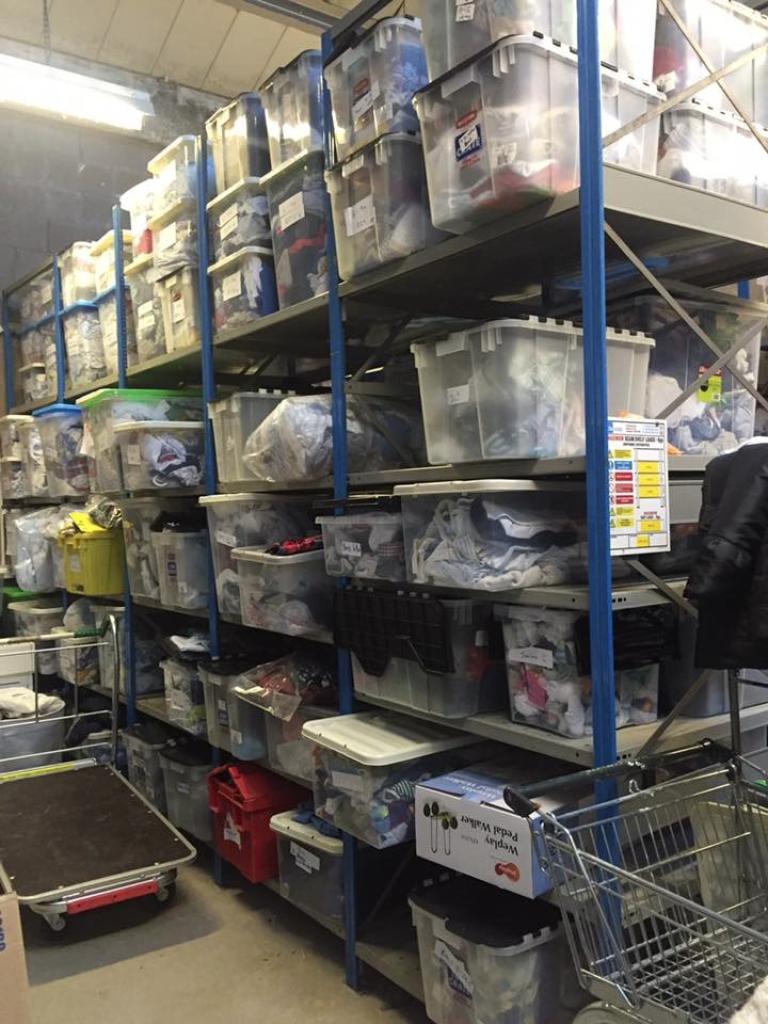
Within hours, Bernadette had rallied the volunteers and bags of clothes, food and even a new pram for the unborn baby were sent to Marie’s door.
“I can’t thank her enough,” says Marie. “I don’t know what I would have done without her.
“All I had was Bernadette. She’s an amazing woman and I want to help her.
“I’m not ashamed of asking for help. My children are my priority and I don’t mind asking for help now.”
The perceived shame of asking for help is something, perhaps one of the few things, those that know Bernadette say she gets angry about.
Baby bank volunteer Jillian Thompson says she often sees Bernadette cry when the stories behind the emergency calls come through, but it’s a tougher side that comes out when the grandmother speaks of the stigma of mothers on benefits.
“These are poor souls, beautiful women who could be any one of us when times get tough,” says Bernadette angrily.
“How can anyone deny a child in need or not help a mother desperately trying to provide for her child?”
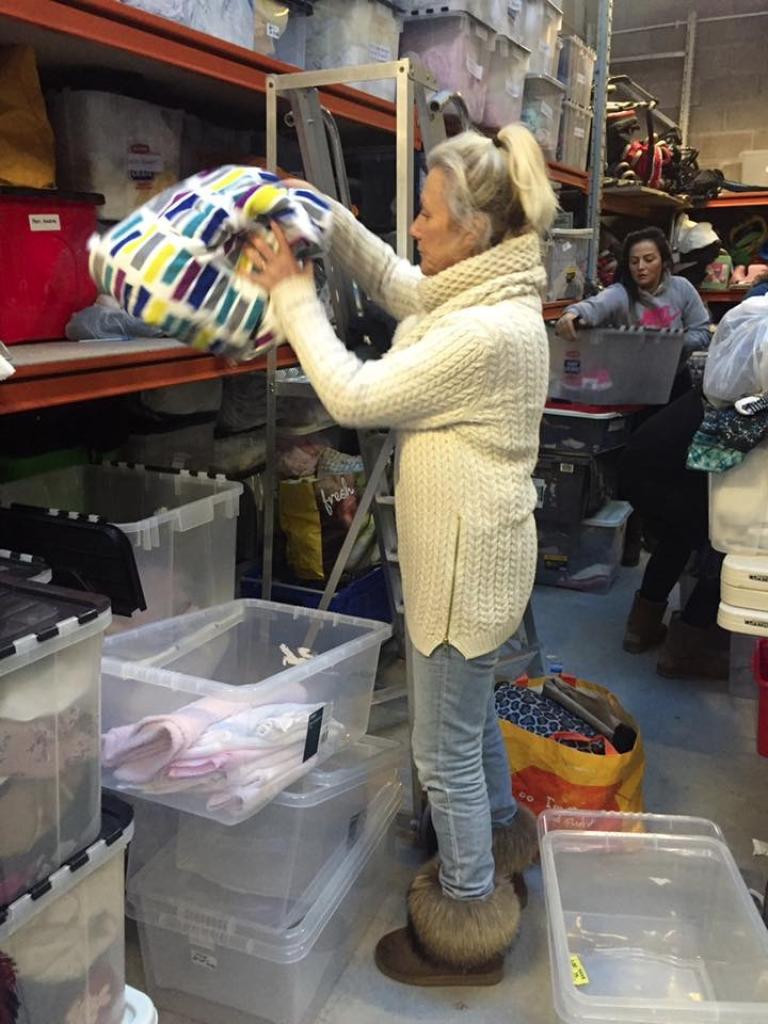
The grandmother is thankful, though, for the sheer amount of support she gets from the public and her local community.
“People have been so kind,” says Bernadette. “They have donated so much and it restores your faith in humanity.”
Now though, she knows the entire future of her project rests on that one person out there who might be able to keep her work going.
“I must just stay positive,” she says. “Someone must know of one place somewhere.”
The women and others she has dedicated her life to helping are wishing just as much as she is that an answer will be found soon.
Not just for the families in need of her help, but, as many admit, for Bernadette’s sake as well.
“It would break Bernadette’s heart if she couldn’t keep this place going,” says Marie.
“She must be absolutely shattered but she has a set of wings and a halo on her head.
“I’m wishing with all my heart that someone can help her as much as she’s helped us.”
I’ve recently discovered a wonderful new store in The Centre, Livingston. It’s called ‘Smiggle’ – First opened in Australia in 2003 and is known for being the world’s hottest stationery brand. Smiggle are the ultimate creators of colourful, fun, fashion-forward stationery. They have an amazing range of bright pens, notebooks and gadgets.
I picked up some fantastic gifts and stocking fillers for Christmas, including Scented Pencils, Scented Erasers and a Talking Alarm Clock.
I’ve gone back online tonight to have a look at a few items which caught my eye in the sale. There’s lots of bargains still to be had! So whether you’re wanting to stock up for birthday gifts or simply stand out from the ‘office crowd’, Smiggle is THE place to pick up your stationery! You’ll love it!
Also, if you sign up to SmiggleMail, you receive 20% off your next purchase!
They’re not just in Livingston – They’re worldwide, with stores in Australia, New Zealand, Singapore, Malaysia, Hong Kong and the United Kingdom.
Standing in the Post Office queue, I was aware of two ladies in front exchanging words. The ‘older’ of the two ladies was standing with her pink pram and baby girl. I’d say she was early to mid-forties. The other looked like she was in her early thirties. It turned out that whilst the younger of the two ladies had been cooing over the baby, she asked the ‘older’ lady how old her granddaughter was.
The cheeky comments weren’t coming from the ‘older’ (no doubt offended) lady, she was actually quite calm. It was the younger of the two who was being overly vocal in an attempt to drag others into the conversation, trying to justify her comments. As I stood there trying my best to listen (without being obvious), it dawned on me, I’m 41, have my baby with me . . . . . Oh no, was she going clock me and (TRY to) start on me? Suddenly it made me think about my situation and about how amazing it actually is to be an ‘older’ mummy!
Here’s some reasons why frankly, being an older mummy is amazing.
We all know how painful toothache can be, so we can only imagine how painful teething must be.
Grace got her first tooth at 5 months old, followed by another 2 at either side of it. Then in the last month the wee soul has had 3 top teeth come through all at the same time. It’s heartbreaking to see her in so much pain, chewing at anything she can get her hands on, rosy-cheeked, drooling, tired from broken sleep, Calpol’d up . . . . So, after a lot of online research, advice from my Dentist and advice from other parents, I decided to give Amber Teething Jewellery a try.
As you’d imagine, it’s a bit of minefield when you Google “Amber Teething Jewellery” as literally pages and pages of companies appear. So, after further research and reading reviews, I opted for an “unpolished multi-colored bean bead amber teething set”, which consists of a necklace and anklet and is from “AmberMe UK” (http://amberme.co.uk/unpolished-multicolored-bean-beads-amber-teething-set-teething-necklace-anklet/) – And I have to say, it’s the best £29.95p I’ve spent in a long time!
Amber teething necklaces & anklet bracelets are a traditional European Baby Teething Remedy and AmberMe UK offers the largest selection of Baltic Amber teething jewellery products on the internet.
AmberMe products are made of 100% genuine Baltic amber and their shop offers new edition designs that you won’t find anywhere else.
So, how does Baltic amber work?
Unpolished amber jewellerey is more effective in releasing the succinite. This is a substance that is found in nature and in our bodies (in much smaller amounts than Baltic amber). Succinite acts as an anti-inflammatory and an analgesic. Succinite is recognized by the medical world and is chemically manufactured today by the pharmaceutical industry for use in immune system medications among many applications. The healing benefit of Amber has been known about since ancient times. Amber have been used throughout Europe for generations. The amber must make direct and continuous contact with your skin, it will warm against your body and the succinic acid will be absorbed through your skin helping with pain relief. The longer you wear amber jewellery the more health benefits you can expect from it. Plus, AmberMe use only AAA class jewellery grade raw Baltic amber material. Their talented artisans DO NOT use plastic amber imitation or reconstructed or melted amber.
Amber teething necklaces & anklets are generally one size: amber teething necklaces – 12.6-13 inches/ 32-33 cm. and Amber teething anklets/bracelets – 5.5-6.0 inches/ 14-15 cm. This is generally a good size for most young children, regardless of age.
I have to be honest and say that I was slightly nervous about Grace wearing a necklace however, all of AmberMe products are designed to be safe and they are threaded on cotton. If they are pulled hard or caught in something, they will break, but if they do break, only one bead will come loose because they are knotted between each bead.
As a safety feature there is a knot before and after each bead, so that even in the extremely unlikely event of the string being torn, no beads are lost and there is no risk of choking, necklaces are secured with a traditional screw clasp, not a sterling silver hook and ring!
*The thread is knotted after each bead, if the necklace should break the beads will not scatter everywhere.
*Amber teething necklaces should be removed when baby is sleeping or unattended! (You can put it under baby pant leg, around the ankle at night)
*Amber teething necklaces are made for wearing, not for chewing! Amber will crack and break under too much pressure.
To get an exclusive 10% discount, please quote: QUN15U50427 at the checkout.
During my pregnancy I read a fantastic article about ‘Baby Boxes’ which are given to every expectant parent in Finland . . . .
It was only once sat on the living room floor with his wife Sara, surrounded by the contents of their new ‘baby box’, that it suddenly hit home for Heikki Tiitanen he was about to become a father.
“We were both in tears,” he says fondly, “going through all the baby items was the moment when I truly understood that we were going to have a baby in the house. As a first-time father, it made everything more concrete.”
Like more than 95 per cent of all expectant parents in Finland, the Tiitanens had just collected the iconic cardboard package from their local maternity and child health clinic, gifted from the government to help prepare them for family life.
“It really helped us as first-time parents to prepare for the baby both mentally and materially as we knew most essentials were already waiting for the baby,” explains Tiitanen. “I’m not ashamed to say it was a relief to know we were that little bit more ready.”
A Finnish tradition for nearly 80 years, the infamous ‘baby box’ is given to all families regardless of income and contains around 50 of the most vital products needed for the first year of a baby’s life.
The items are beautifully packaged inside a cardboard box that will double up as a bed for the baby’s first few weeks.
It’s a phenomenon that has made headlines across the world, sometimes unfairly branding Finns as somewhat whacky or eccentric, but the concept is undeniably successful.
Infant mortality rates have reduced dramatically in Finland since the care package was first brought in, for which medical professionals thank the accompanying health-checks and counselling sessions families are asked to attend in order to receive the products.
But the baby box is more than a material incentive – once an impoverished nation of poor health, Finland is now known for having one of the best maternity care systems in the world.
Talking to two friends who had also become fathers around the same time, Tiitanen realised they had all had shared “eureka” moments upon opening up their maternity boxes.
“We started to ask around and heard over and over again how receiving the box had made parents feel better prepared and how memorable the moment of opening the box had been.
“It struck me how lucky we were to have a state that provided this care, and that we could bring the same joy to families elsewhere.”
The FANTASTIC news is that Nicola Sturgeon has announced that EVERY baby born in Scotland, from New Years Day 2017 will be gifted a (free) ‘Baby Box’. She said the Nordic-style Policy, which was first announced in April, would be a “symbol of belief in a level playing field” for all children. Finland has been giving out care packages to all expectant mothers for 80 years. The boxes, which include around 80 items useful for babies, have been credited with cutting infant mortality and raising life chances.
Read the full article from the Independent here: http://www.independent.co.uk/news/uk/politics/scotland-baby-boxes-nicola-sturgeon-speech-live-snp-conference-a7363256.html?cmpid=facebook-post
It’s been a busy few weeks with a family holiday, wedding in Ireland, 3 (baby/ toddler) Halloween parties, Grace moving into her “big cot” in her own bedroom, tooth number 3 coming through for Grace and of course, shopping.
I’ve digressed a bit this week as I want to share a really interesting article with you all. As a new mum, I’m regularly asked if Grace sleeps well. Generally she sleeps very well, but latterly with her teeth coming through, we can be up several times throughout the night with her. When I hear other mum’s being asked the same question and hear them reply “yes, my baby sleeps all night” I find myself biting my tongue, preventing me from saying “Bull*hit! who has a baby who sleeps all night???” – Grace sleeps for 12- 14 hours a night, but during that time she’ll be up 2- 3 times, so does that count as sleeping “all night?”
So, why do we say it? Is it peer pressure? Is it fear that you’ll be perceived as not being in control of your child’s sleeping habits? Who knows, but lets just be honest – there’s only so much make up we can wear to hide those bags from under our eyes when we’ve had a couple of sleepless nights. Despite me knowing that when it comes to Grace’s sleeping habits, we’re not doing anything wrong, I did feel a bit of contentment when I read a really interesting article from the BBC News, entitled “Is it right to train babies to sleep?” which my husband sent me.
If like me, your baby wakes up during the night for a feed, a change of nappy or just a cuddle, you’ll be glad to know that you’re in good company. In fact, 84% of the clients who participated in the ” Sleep: what is normal at six months?” (part of the Avon Longitudinal Study of Pregnancy and Childhood) study said there babies do NOT sleep through the night. So, next time you are asked if your baby sleeps well, or sleeps through the night, be honest. More importantly, be proud, there’s no shame in the fact that your baby needs fed, changed or wants a cuddle and a bit of company during the night – You’re doing a great job!!!
It’s 2am and if you are the parent of a baby who does not sleep well you may well be pacing up and down in your baby’s room trying to get your little one off to sleep.
Cold, tired and craving the comfort of your bed, you may be rocking or feeding the wailing child, singing, or just sitting by the cot holding a little hand – anything to get him or her to drift off again.
Anna Cormack from Manchester knows what sheer exhaustion feels like. She has three children – Johnny, the youngest, is 15 months old and wakes up at least two to three times in the night for breast feeds. Cormack feeds him to sleep and has not had a full night’s rest since he was born. Her partner frequently works at night, so night-time parenting falls to her.
“When it’s really bad I probably only get two-three hours’ sleep in the night,” she says. “What every parent would tell you is that it’s the cumulative effect. You can do one night, even two, but it’s constant. Night after night it has an effect on you.”
More than half of a group of 7,500 parents who took part in a survey released last week by The Children’s Sleep Charity and Netmums said their child woke at least once a night, and 35% said they were regularly sleep-deprived and exhausted – and this included parents whose children were no longer babies.
 Image copyright Anna Cormack
Image copyright Anna Cormack Cormack says she copes well but would like to have more energy and creativity, and better memory.
“I often can’t be bothered to go out to groups [or] see friends because I am too tired. Also it makes me obsessed with Johnny having his naps at home so I can nap too, which makes me quite house bound,” she says.
This is the kind of experience that might make some parents these days consider hiring a sleep consultant. There weren’t many of them around 10 or 15 years ago but the number has rapidly increased in the UK in the last five years, says Julie Cleasby, European Regional Director for the Association of Professional Sleep Consultants.
Cormack was put in touch by the BBC radio programme You and Yours with Katie Palmer, a former nanny and mother-of-three who co-runs Infant Sleep Consultants with two other women.
Like many other sleep consultancies, the company offers a range of packages, from telephone and online support, to home visits and overnight stays. The last of these would be easily affordable by someone like the chef, Jamie Oliver, who recently hired a night nurse for his newborn River Rocket, but might be a stretch for many parents.
Palmer says it’s very common to come across a child like Johnny who won’t go back to sleep after waking at night without being breast-fed.
“When we say we sleep through the night, none of us actually sleep through the night,” she says. “We all naturally wake several times a night, it’s kind of a caveman instinct where you would wake to check for predators.”
Find out more
 Image copyright Thinkstock
Image copyright Thinkstock Listen to a report on sleep consultancy on BBC Radio 4’s Call You and Yours, with Prof Helen Ball of Durham University and James Wilson, a sleep consultant with the Children’s Sleep Charity
Children have much shorter sleep cycles than adults and can wake more than 10 times a night, Palmer says, and what parents need to do is to help their child knit these sleep cycles together.
In Johnny’s case, she says she did not immediately eradicate all of his night feeds but set up a schedule where these were gradually reduced to just one per night. She says this gave Cormack and Johnny clarity about when he would be settled back to sleep and when he would be fed. After this she introduced a sleep training programme called “gradual retreat”.
“So, for example, the first time Anna fed him, she put him down in the cot and then she sat next to him and patted and stroked him until he fell asleep. And then, when he accepted that, she just sat next to him, not patting him. Then she moved further away and further away until she could go out the door,” says Palmer.
Johnny cried intermittently for around 15 minutes on the first night, Palmer says, but then accepted the changes to his bedtime routine. There are children who cry for longer, though, and in this case she says the parent should be a comforting presence. What parents shouldn’t do is to give the baby mixed messages by reverting to feeding him or her to sleep.
 Image copyright Thinkstock
Image copyright Thinkstock “There aren’t always tears, but I think the majority of the time there is,” says Palmer. “I think that if there was a guaranteed no-cry sleep solution I wouldn’t have a job, because it would be out there and every parent would do it.”
Although she does not advocate the “Cry it Out” technique, where a baby is placed in the cot at bedtime and the parent does not return, even if they cry, she does sometimes use a form of “controlled crying”, where the parent leaves a child’s bedroom, but returns at short intervals to comfort the baby.
Some researchers who have studied the effect of leaving a baby to cry have measured elevated levels of the stress hormone, cortisol, and it’s been speculated that this could harm the child’s emotional development. Another study, however, found no negative effects on children five years after they had been sleep-trained with this technique. So the picture is unclear.
“Any kind of crying is stressful… and it does raise cortisol levels,” says Palmer. “However sleep deprivation also isn’t great and can do long-term damage as well, and I think it’s deciding what is more sustainable and what you believe.”
Palmer admits that sleep training is not for everybody. She says you should never sleep-train a baby under six months old, or if there is an underlying reason that has not been addressed – like reflux or colic. Also, the parent needs to be in the right frame of mind and shouldn’t feel pressured to do it by friends or family.
But should we even be attempting to sleep train babies at all?
“If you look at the research, what we know is it’s entirely normal for a child to wake regularly at night until about two-and-a-half years of age,” says Sarah Ockwell-Smith, author of The Gentle Sleep Book.
Many parents believe their child has a sleep problem, she says, when in fact it is just normal infant sleep.
She says she sees mothers who have tried sleep training and it did not work for them, or it initially worked, but then a few months down the line their child’s sleep had become worse.
Sleep statistics
 Image copyright Thinkstock
Image copyright Thinkstock According to the report – Sleep: what is normal at six months? – part of the Avon Longitudinal Study of Pregnancy and Childhood:
“We always make it out that the baby’s got the problem and it’s the baby that needs to be fixed, when actually I think it should be the parents adjusting things,” says Ockwell-Smith.
“So I would help parents to look at things like, ‘Is the environment right? Is the baby eating something that’s causing an issue, is there something physiological underlying it, is it something to do with the timings of things that’s causing an issue?'”
In her view, it is totally natural to feed a baby to sleep.
“If you look at any other mammal – if you go to the zoo – the babies will all fall asleep with the mums holding them, so that’s normal, that’s how it’s meant to be,” says Ockwell-Smith.
“If they’ve fully woken it’s because there’s a problem, but the parent coming in feeding them or cuddling them will resolve almost any problem… I’ve worked with thousands of parents who still rock and feed their babies to sleep and they’ve managed to increase sleep.”
Ockwell-Smith says she finds that once parents are aware their baby’s interrupted sleep is normal then their fears are often allayed.
“I don’t think we should be embracing the fact that we’re just not going to sleep,” says Ockwell-Smith. “It is normal, but it’s also incredibly exhausting and there normally are some tweaks you can make that will make an improvement, but I think we should expect some waking as normal and embrace it.
“Nobody in 10 years’ time is going to think, ‘Oh I wish I hadn’t hugged my baby so much’. You’re not going to regret rocking your baby to sleep or feeding them to sleep.”
Ockwell-Smith says she is concerned that the sleep consultant industry is unregulated and that anyone at present can set themselves up to practise. Palmer would also welcome regulation in order to keep standards high, and she advises parents to do as much research into practitioners as possible before hiring them.
Prof Helen Ball of Durham University argues that it’s crucial for parents to ensure that their consultant sticks to safe infant sleep practices – and does not, for example, advise putting babies to sleep on their tummies, which dramatically increases the risk of Sudden Infant Death Syndrome.
How did sleep training work for Anna Cormack and Johnny?
After three-and-a-half weeks of the programme, Johnny now wakes up once in the night at around 1am or 4am. He is also falling asleep on his own in the cot without being breast-fed.
And after 15 months, Cormack is finally getting more sleep.
A few weeks ago I was online having a browse through the Ralph Lauren website, putting things which I liked into the shopping basket but with no real intention of buying at that time. As my basket filled up, my excuses, sorry, my justification for buying our 5 month old baby designer clothes began to come to the forefront of my mind. The ‘justifications’ were ridiculous! ‘Grace will love having a pony on her clothes’ was the best I could come up with and if I’m being honest, really wouldn’t cut it! So, as I did a quick recky of what I’d put in the basket, changing the sizes so the clothes would be suitable for the seasons, it came to me, I’ll use the ‘she’s had them for ages, they were a present from . . . ‘ story – Technically, this was the truth. Grace is 5 months old, I’m buying 9, 12 & 18 month old clothes, so in theory by the time she fits into them, she’d of had them for ages and they’re all presents from me! 😉 Ta da!!! Debit Card details entered, now just to wait on delivery of the gorgeous new outfits.
Fast forward a few days. The Joiner arrived to build our new garden fence. After checking that he had everything he needed (tea, electricity etc), Grace and I headed out to our Parent & Baby Group. A few hours later we came home, had a quick chat with the Joiner, then went indoors. Not long after, my husband arrived home from work. Whilst having a chat about our day, we heard a big thud, followed by a muffled scream. We ran outside to check what had happened but the Joiner was nowhere to be seen (strange as our garden isn’t that big)? Seconds later, we heard a muffled ‘help’ coming from behind the shed – Whilst putting up the dividing fence, the joiner lost his footing, slipped and managed to get wedged between the fence and the shed! I took one look and had to run indoors as I couldn’t stop laughing! (And with what I now call my ‘pregnancy bladder’, I knew this wouldn’t end well if I stayed to watch him try to get out). Eventually, after watching some of the antics from the window, my husband managed to help the flustered Joiner out from behind the shed. I went back out to try to ask if he was okay. I say ‘try’ – I couldn’t control my laughter when speaking to him! After we’d all calmed down and I’d managed to stop laughing, the Joiner announced that he’d forgotten to tell me that whilst I was out he’d signed for a delivery for me. As he reached for the parcel, he announced ‘it’s from Ralph Lauren, look at the fancy packaging’. ‘Noooooooooooo’ I screamed inside my head, this is my secret shopping!!! Just then, my husband looked at me, giving me that ‘oh no, you’ve been shopping again’ look, asking ‘is it for you or Grace?’, knowing fine well that it was for Grace. I gave him my best smile and said ‘it’s a surprise, for you’ and quickly walked back into the house, thinking about where I was going to hide this lot for the next 4 months 🙂
The moral of this ‘shopping experience’ . . . . . Never laugh at the Joiner wedged between your fence and shed, as he’ll land you right in it!!!
PS. I ended up showing my husband a couple of things and he loves them 🙂